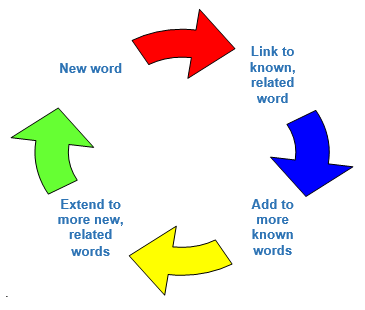Package 5 – Linking and extending recorded academic vocabulary
Linking and Extending
One of the methods which seems to prove highly effective in retaining new words and expressions is to link or connect them to existing vocabulary. As we have already mentioned, it is still very important to group words together, but this does not mean that you should only record new words.
Look at the example below.
adversary …………………..link to…………………opponent
Once you have done this, it is possible for you to add existing words in order to broaden your base and then to extend your usable vocabulary to a more sophisticated level.
New words![]() Known words
Known words![]() Other known words
Other known words![]() More new words
More new words
adversary...link to…opponent.....add to…enemy / competitor…extend to…rival / contender

Activity 1
Link, add and extend these words from the academic word list
| New vocabulary | Link to existing word | Add to other known words | Extend to other new words |
| spectator, spectacle | include Ans: include | integrate Ans: integrate | embody Ans: embody |
Vocabulary notebook
You are also strongly advised to keep a vocabulary notebook either in a book or online. Research has shown that recording, reviewing and extending vocabulary using the strategies that we have looked at, significantly improves learners’ active and passive vocabulary.
Useful websites
You may also like to visit these websites for further information and practice on vocabulary.
